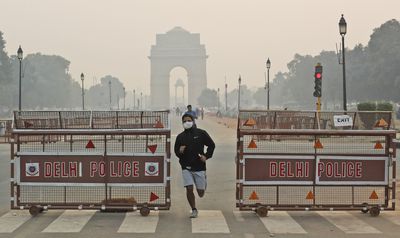

The sixth annual World Air Quality Report reveals troubling details of the world's most polluted countries in 2023.
The study looked at fine particulate matter, or PM2.5, which is the tiniest pollutant but also the most dangerous. Only 9 per cent of more than 7800 cities analysed globally recorded air quality that met World Health Organisation standard, which says average annual levels of PM2.5 should not exceed 5 micrograms per cubic metre.
Living with poor air quality can shave three to six years off a person's life, scientists say.
Click through for the 10 countries with the worst air pollution.

10: Democratic Republic of Congo
The mineral-rich African country, like many on the continent, suffers from poor air quality.
The intentional burning by multinational energy companies of natural gas near drilling sites has been a major contributor.

9: Egypt
Egypt's capital Cairo, which has a population of more than 22 million people, has long been notorious for its fouled air.
Archaeologists have become concerned that the pollution may even damage some of the country's famous artifacts and historical sites, such as the pyramids on the edges of Cairo.

8: Nepal
Known as the roof of the world for its mighty Himalayas mountain region, which includes Mount Everest, Nepal has some of the purest air in the world.
But the capital city Kathmandu has high levels of air pollution due to lack of regulation for factories, building sites and vehicle emissions.

7: United Arab Emirates
The resource-rich United Arab Emirates (UAE), which includes the super wealthy cities of Dubai and Abu Dhabi, has worked on selling its green credentials.
But the UAE has dangerously high air pollution levels, creating major health risks people who live there. More than 1800 people die every year from outdoor air pollution caused by the vast use of fossil fuel, toxic chemical spills and sandstorms.

6: Iraq
Iraq ranked sixth worldwide for the worst air quality.
Exhaust from cars, electric generators, and fires at oil and gas refineries have contributed to the fouled air. The damage to infrastructure from recent was has also played a part.

5: Burkina Faso
The air quality in the West African nation of Burkina Faso is considered unsafe by the World Health Organisation.
Air pollution is shortening lives by 2.4 years for the average resident and in neighbouring countries.

4: Tajikistan
The current air pollution level for Tajikistan in Central Asia is more than three times above WHO standards.
One of the main reasons has been the government's race to industrialise the poor landlocked nation by expanding fossil fuel power stations and building more factories.

3: India
Some of the larger cities in India exceed the WHO air quality guidelines by more than 10 times.
Begusarai, a city of 500,000 people in northern India's Bihar state, was the world's most polluted city in 2023.

2: Pakistan
Poor air quality is responsible for shaving nearly four years off the lives of Pakistanis.
The city of Lahore, which has a population of more than 13 million, is worst impacted, with air pollution cutting life expectancy by seven years.

1. Bangladesh
Bangladesh has the most polluted air in the world.
The average air quality in the country of 170 million exceeded the WHO safety guidelines by nearly 16 times.